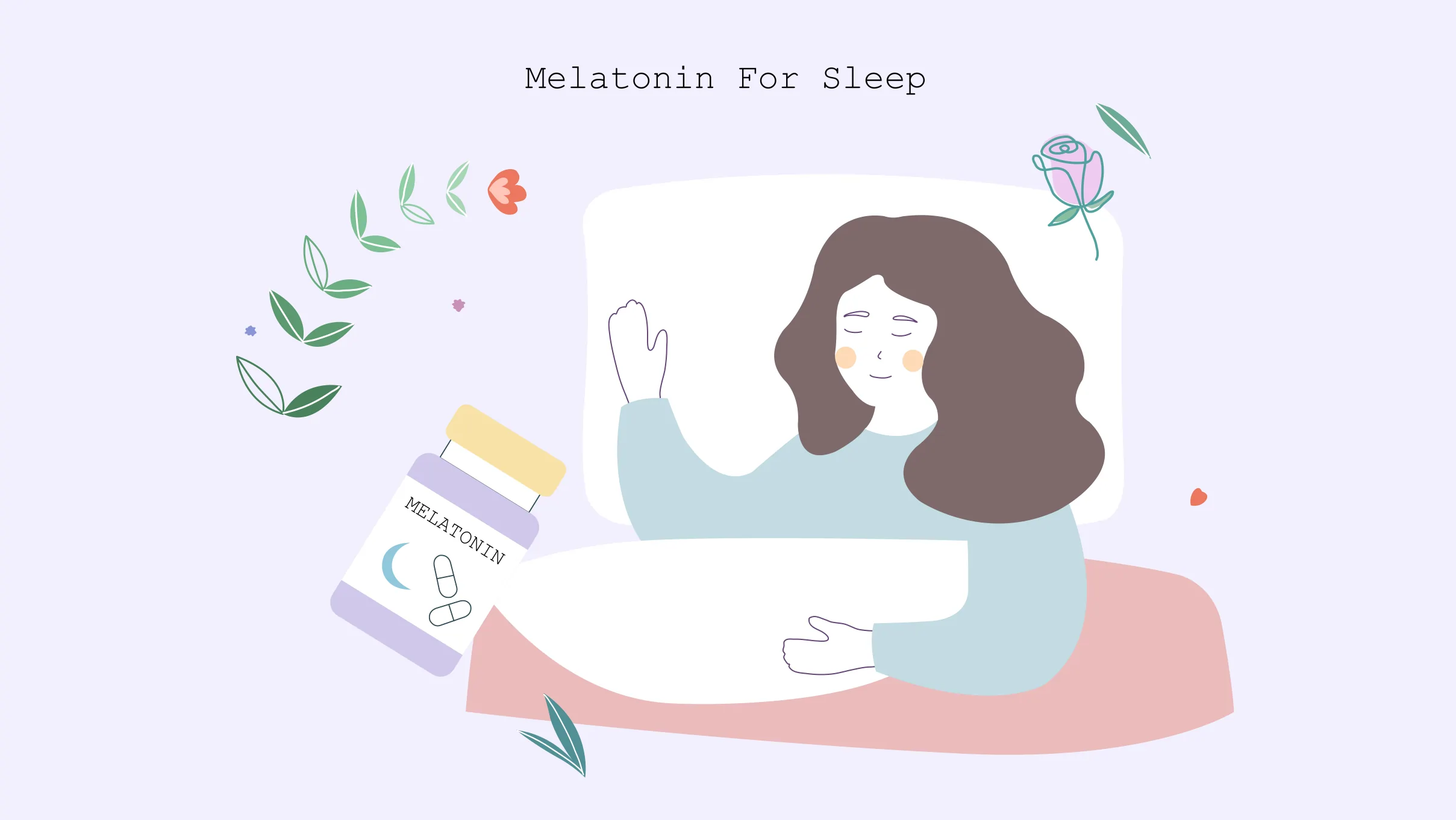Melatonin for Sleep: Does It Work?
Written by


Our bodies are home to numerous hormones you might already know about. But have you heard about the “sleep hormone”?
If you haven’t already, there is nothing to worry about because you are at the right place.
Melatonin, also known as “the light of night,” is one of the predominant hormones that controls your sleep cycles. You can also refer to it as the central part of your body’s sleep-wake cycle.
This article will tell you everything about melatonin for sleep, its artificial supplement, and other essential details. So, buckle up because it will be interesting and equally informative.
But before we proceed, let us quickly understand the fundamental meaning of melatonin and its significant functions.
What Is Melatonin?
Also known as the sleep hormone, the pineal gland primarily produces melatonin in your brain in response to darkness, which is an external stimulus. It plays an important role in clicking with your circadian rhythm, better known as the 24-hour internal clock and the regular sleep timings. Since it is naturally responsive to darkness, exposure to light at night can usually halt melatonin production. In other words, melatonin levels are typically low during the daytime while they are at their peak levels during the nighttime.
In addition, it is also prepared artificially in laboratories as a supplement that induces melatonin benefits for sleep. These help people experience specific conditions such as disturbed sleep-wake phase disorder, anxiety problems, migraine, and jet lag. Since the dosage and other requirements are not officially regulated, it is recommended to consume the supplements under the strict administration of a medical healthcare professional.
How Does Melatonin Work?
Now that we have a good idea of what melatonin is, let us understand what goes behind the whole mechanism and how melatonin works!
Melatonin is primarily produced by the pineal gland in your brain. The time zones play an integral role here because the melatonin levels in your brain usually go up at dusk as the darkness falls. However, the levels are at their peak, especially during the middle of the night but eventually reach a lower point with the arrival of dawn.
Due to the fluctuation in melatonin levels, your brain starts getting repeated signals to keep you awake. This is where you experience sleepiness, as it usually happens at midnight due to fluctuations in the melatonin levels.
This is where melatonin supplements come to the rescue, as they regulate the melatonin already in your body to promote sleep. It ultimately makes you feel tired and sleepy as your regular bedtime approaches.
However, the entire working mechanism of melatonin supplements slightly differs in adults and children. Here is a brief overview of the difference –
Melatonin In Adults
Consumption of melatonin for adults has been a prescribed solution for years. However, experiencing anxiety, difficulty concentrating, and issues managing work-life balance are some significant problems we adults face. In addition, it profoundly impacts our sleeping cycles, making it extremely difficult to maintain consistency.
This is where melatonin supplements help, especially in cases where people experience high anxiety levels and insomnia. It also helps alleviate migraine attacks. Although many other prescribed drugs help with the situation, melatonin can give significant relief as it can inhibit pain sensations to a great extent.
Melatonin dosage for adults is also beneficial for jet lag. Although it is a beneficial remedy for anyone experiencing jet lag, their bodies usually treat the supplement as a darkness signal. As a result, the body experiences a positive effect due to the brightness of the light giving a significant relief.
Melatonin In Children
Melatonin helps children who experience difficulty keeping a regular sleeping pattern. It is also proven to help treat insomnia and other sleeping disorders in children when administered under medical supervision. Although it is usually a widespread method, it is usually considered safe to schedule the dosage frequency as per the recommendations of a medical health expert.
Thus, any given form of melatonin supplement for sleep works exceptionally well in children under restricted amounts and strict supervision.
What is the Appropriate Melatonin Dosage?
If you have also wondered how much melatonin is too much, you need to know a few details. Currently, there is no standard melatonin dosage as different people may have different experiences. While it is usually available in a range of doses, the range usually starts from 1 mg to 10 mg and so on. However, the appropriateness differs in the case of an adult and children. In adults, it is ideal to start with 1 mg and then increase the dose by 1 mg every week until you notice a decrease in the amount of time required to fall asleep.
In children and teenagers, the ideal dosage of melatonin slightly differs. It is usually recommended to consult a paediatrician, as it can be an underlying behavioural issue or medical condition.
Benefits Of Melatonin For Sleep
Melatonin supplements help people experiencing disturbed sleeping patterns and irregular cycles. However, many other related benefits of melatonin essentially show the benefits of melatonin for sleep. Here are a few of them –
Aid With Jet Lag
Melatonin is best known to help with jet lag, usually when your body’s internal clock is not in sync with an unfamiliar timezone. It is usually experienced by people working night shifts since these hours are typically for sleep. So, melatonin brings your body’s internal clock back in sync concerning the external time change. However, it is always advisable to have a consistent sleep schedule with little to no consumption of alcohol and caffeine for better results.
Lessened Delay In Sleep Phase Syndrome
According to recent research, the melatonin benefits for sleep have proven to reduce the approximate time it takes for an individual dealing with delayed sleep phase syndrome to fall asleep. In this condition, the final stage of sleep is usually delayed by a couple of hours, surpassing the regular bedtime, making it difficult to wake up at a specific time. Melatonin helps in regulating this cycle to avoid any delay.
Mediation Between Thermoregulatory And Arousal Systems
Melatonin also helps with thermoregulatory effects concerning sleepiness as a mediator. It helps in increasing sleepiness by working as a circadian modulator for thermoregulatory set point. It also plays a vital role in regulating the body temperature so that the person does not experience discomfort.
At the same time, melatonin components create a balance between the nature of the system and the thermoregulatory setting. Therefore, the supplement plays a massive role in fine-tuning irregular sleeping patterns.
Side Effects of Melatonin
Since melatonin is also consumed as a supplement, there can be specific side effects depending on several factors. Although a person is unlikely to experience any severe side effects or withdrawal symptoms, there can be a few mild ones in exceptional cases, depending upon the requirement of how much melatonin to take for sleep. Let us take a quick overview of these for a better understanding!
Blood Thinning
If you have been recommended higher doses, blood thinning can be a potential side effect. Melatonin may cause blood coagulation. Therefore, it is always better to consult a doctor before taking further high doses.
Lower Body Temperature
For a given case, depending on what is melatonin used for, it might decrease your overall body temperature. While it is not usually a significant problem, consider it if you experience discomfort keeping warm.
Allergic Reaction
Melatonin supplements can also cause an allergic reaction. Although it is not a very common symptom, you may still experience slight difficulty if you are allergic to any of the components used in the supplement. Therefore, it is always advised to do thorough research regarding its composition and consumption methods before going ahead.
Is Melatonin Safe For Children?
So far, the research has shown an exceptional safety record in melatonin consumption among children. It is, in fact, a very commonly recommended supplement for children experiencing difficulty falling asleep. It has also proven effective in children with Autism Spectrum Disorders and ADHD, as they experience frequent sleep problems. Needless to say, melatonin dosage for kids must be strictly administered under the supervision of a medical health expert. Nevertheless, it is a safe and effective supplement even after consuming it for an extended period.
However, it is essential to know that it may only work well for some cases because the consumption and timing of dosage may differ from child to child. In such cases, scheduling the dosage timings according to the doctor’s prescription is usually recommended. Since each case is unique, one must be careful while administering its dosage frequency in children.
How to Choose Melatonin Supplements
Choosing the right supplement depends on what is melatonin used for in a given case. These supplements are available in the market in various forms, including capsules and tablets, gummies, liquids, sprays, and powders. Here are a few things you need to keep in mind while choosing the right supplement for you –
Capsules and tablets
If you choose to go with capsules and tablets, make sure to buy the ones your doctor approves of. Usually, these tablets and capsules have a longer shelf life and are easy to divide. You must also avoid any kind of melatonin capsules or tablets that come with artificial flavours and preservatives since these may not be safe to consume.
Liquid melatonin
If you prefer liquid melatonin, always go for the gluten- and alcohol-free ones. You must only fix the dosage after consulting with your doctor, or else it may lead to a melatonin overdose. The biggest benefit of consuming liquid melatonin is that it is usually easier to consume if you do not consider taking pills.
Gummies
You can also go for gummies as a suitable melatonin supplement since these usually taste good, are chewable, and are easy to swallow. However, it is always recommended to go for sugar-free gummies approved by your doctor.
Conclusion
Although melatonin is a naturally occurring hormone in your body, artificial supplements are great for dealing with a sleep-wake cycle casualty. As important as it is to consume it consciously, it is equally important to follow the procedure. This article helped you get some fascinating and informative insights into the functioning of natural melatonin and the usage of melatonin as a supplement.
FAQs
What is parasomnia?
Parasomnias include unpleasant sensations or behaviours that happen when you sleep or are partially awakened
How is PLMD treated?
Patients with PLMD may have a reduction in their periodic limb movements after taking dopaminergic medications such as pramipexole, ropinirole, and rotigotine, as well as other medications like gabapentin and pregabalin, which are the cornerstone of treatment for RLS.
What does PLMS look like?
During sleep, those with PLMD frequently jerk, cramp, or twitch their lower limbs. These periodic limb movements (PLMS), which can last up to an hour, occur every 20 to 40 seconds.
Is PLMD related to Parkinson’s?
Patients with narcolepsy, REM behaviour disorder and Parkinson’s disease frequently experience PLMS. It is rare to have true PLMD, for which periodic limb movements during sleep must be disruptive and cannot be explained by another primary sleep condition, such as RLS.
What kind of doctor treats periodic limb movement disorder?
Your doctor has the right to suggest a neurologist to you at any time during your examination (a specialist in nervous system disorders). This expert can support the diagnosis of PLMD and aid in excluding other neurological conditions.
people like this article
Written by





